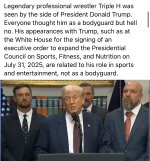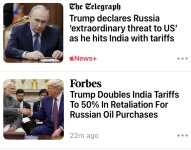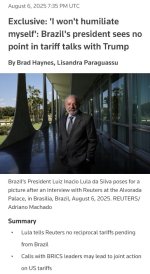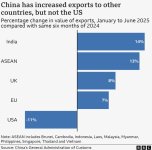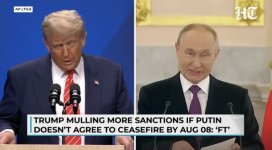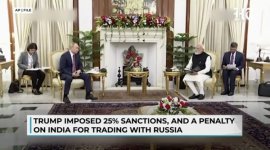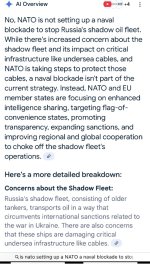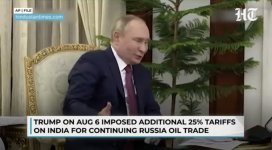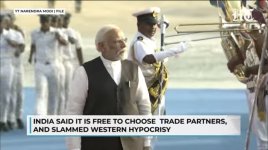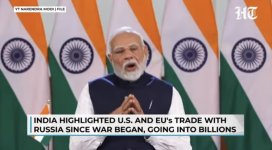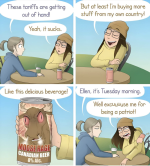"The U.S. tariff hike lacks logic," Dammu Ravi, secretary of economic relations in India's foreign ministry, told reporters.
"This is a temporary aberration, a temporary problem that the country will face, but in course of time, we are confident that the world will find solutions."
India is already signalling it may seek to rebalance its global partnerships. Modi is preparing for his first visit to China in over seven years, suggesting a potential diplomatic realignment amid growing tensions with Washington.
Brazilian President Luiz Inacio Lula da Silva said on Wednesday he would initiate a conversation among the
BRICS group of developing nations about how to tackle Trump's tariffs.
He said he planned to call Modi and China's Xi Jinping. The BRICS group also includes Russia and South Africa.
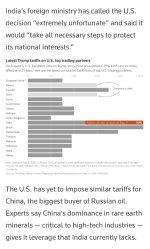
(Is this where Canada being a 51st state fits in?)
Indian Prime Minister Narendra Modi said on Thursday he will not compromise the interests of the country's farmers even if he has to pay a heavy price, in his first comments after U.S. President Donald Trump's salvo of a 50% tariff on Indian goods.

apple.news
Trump has repeatedly offered to convert Canada from a sovereign nation to “the 51st state” during his second term as U.S. president. The move would enhance America’s access to critical minerals largely controlled by China, and pave the way for U.S. access to new ocean shipping lanes in Canada’s Arctic being created by melting sea ice.
Trump's now well-worn claim that Canada should become "the 51st state" is far more than negotiation table bluster, says Pricewaterhousecoopers.

apple.news
Ontario is at odds with Saskatchewan over Canada's response to the escalating trade war. Ford has called for immediate retaliation, while Saskatchewan Premier Scott Moe is urging Ottawa to dial down its retaliatory tariffs.
"Maybe it's time for Canada even to at least not add additional counter-tariffs in this space, but to even consider removing some of the counter-tariffs that are harmful to Canadian businesses and Saskatchewan businesses today," Moe said during a radio interview earlier Wednesday, adding the country is currently largely "protected" under the CUSMA trade pact…as long as Trump continues to respect that trade pact…Sector-specific tariffs, like the 50 per cent duty on steel, aluminum and copper, remain in place.
Ontario Premier Doug Ford is warning that U.S. President Donald Trump could c

apple.news
Canada has breathing room because of the USMCA, and so does Mexico. It (Mexico, not Canada) got a 90-day extension on negotiations, with no new tariffs, on the same day as Canada was hit with the 35-per-cent levy.
The USMCA has allowed Ottawa to rag the puck, and to avoid caving in to Washington’s demands as quickly as other trading partners. Time may work in Canada’s favour. The 35-per-cent tariff, whose legal excuse is that Canada is flooding the U.S. with fentanyl, is
likely to be struck down by the U.S. courts, though that won’t happen quickly. Negative economic news – a
small helping of which
arrived last week –
could (?) lead the American public and business to
push back more forcefully against Mr. Trump’s tariff plans, or not.
Canada has breathing room because of the United States-Mexico-Canada agreement, but it is up for renegotiation next year

apple.news
The idea that Canada can win a dollar-for-dollar tariff war against a U.S. economy 10 times the size of ours is wishful thinking, which even the Carney Liberals, despite their “elbows up” election rhetoric, understand.
Only two countries hit by Trump’s tariffs have responded with counter-tariffs — Canada and China — because of the reality that they increase costs for their consumers.
While selective counter-tariffs can be useful, a dollar-for-dollar tariff war with the U.S. would harm Canada in a war we would inevitably lose.
There’s a welcome and growing realization in Canada that responding to U.S. President Donald Trump’s tariffs with dollar-for-dollar counter-tariffs is bad public policy. While anyone who said this at the outset of Trump’s tariff war against us in February was branded a traitor by our chattering...

apple.news
If you provoke Washington, tariffs — or their threat — will follow. Since Trump’s return, no countries have drawn more retaliatory attention than China (30%) and Canada (35%).
Trump portrays his tariffs as a tax on foreign countries. But they are actually paid by import companies in the U.S. who try to pass along the cost to their customers via higher prices. True, tariffs can hurt other countries by forcing their exporters to cut prices and sacrifice profits — or risk losing market share in the United States.
But economists at Goldman Sachs estimate that overseas exporters have absorbed just one-fifth of the rising costs from tariffs, while Americans and U.S. businesses have picked up the most of the tab.
Trump’s trade war has pushed the average U.S. tariff from 2.5% at the start of 2025 to 18.3% now, the highest since 1934, according to the Budget Lab at Yale University. And that will impose a $2,400 cost on the average household, the lab estimates.
President Donald Trump's tariff onslaught this week left a lot of losers.

torontosun.com
“The U.S. consumer’s a big loser,″ Wolff said.
